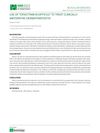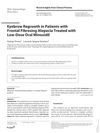 July 2015 in “British Journal of Dermatology”
July 2015 in “British Journal of Dermatology” Treating skin conditions with both psychological and dermatological care improves patient outcomes and can save costs.
 36 citations,
September 2014 in “Paediatric drugs”
36 citations,
September 2014 in “Paediatric drugs” More pediatric-specific research and guidelines are needed to improve hidradenitis suppurativa treatment in children and adolescents.
 67 citations,
January 2013 in “Indian Journal of Dermatology, Venereology and Leprology”
67 citations,
January 2013 in “Indian Journal of Dermatology, Venereology and Leprology” The document concludes that alopecia areata is an autoimmune disease without a definitive cure, but treatments like corticosteroids are commonly used.
[object Object]  56 citations,
January 2019 in “Lancet”
56 citations,
January 2019 in “Lancet” JAK inhibitors help regrow hair in alopecia areata patients, improving their quality of life.
 36 citations,
May 2015 in “Australasian Journal of Dermatology”
36 citations,
May 2015 in “Australasian Journal of Dermatology” Low dose oral minoxidil helps regrow hair in permanent chemotherapy-induced alopecia.

Dutasteride can stabilize hair loss in patients with frontal fibrosing alopecia, but its safety in women is unclear, so use it with caution.
 September 2022 in “XXXIX Congresso Brasileiro de Reumatologia”
September 2022 in “XXXIX Congresso Brasileiro de Reumatologia” Tofacitinib may effectively treat skin symptoms in difficult cases of dermatomyositis.
 April 2014 in “Jurnal Biomedik : JBM”
April 2014 in “Jurnal Biomedik : JBM” An 8-year-old girl had nail and hair issues that improved without specific treatment, but fungal nail infection was hard to cure.

Different hair and nail conditions can indicate health issues and have specific treatments; accurate diagnosis is crucial before treatment.
 61 citations,
March 2009 in “The Journal of the American Board of Family Medicine”
61 citations,
March 2009 in “The Journal of the American Board of Family Medicine” Early diagnosis and treatment of discoid lupus erythematosus improve outcomes.
 53 citations,
May 2010 in “PubMed”
53 citations,
May 2010 in “PubMed” Spironolactone helps regrow hair in women with hair loss.
 39 citations,
February 2021 in “Journal of The American Academy of Dermatology”
39 citations,
February 2021 in “Journal of The American Academy of Dermatology” Low-dose oral minoxidil safely treats hair loss, with hypertrichosis as main side effect.
 8 citations,
December 2020 in “Skin appendage disorders”
8 citations,
December 2020 in “Skin appendage disorders” Low-dose oral minoxidil helped regrow eyebrows in women with Frontal Fibrosing Alopecia.
 6 citations,
February 2019 in “Scientific reports”
6 citations,
February 2019 in “Scientific reports” A brain-produced steroid causes increased scratching in mice with a skin condition similar to eczema.
 2 citations,
October 2020 in “International Journal of Dermatology”
2 citations,
October 2020 in “International Journal of Dermatology” Lichen planopilaris in men often involves scalp redness and itching, with some also having hair loss, mucosal lichen planus, or thyroid disease, and treatment improved symptoms in nearly half of the cases.
 2 citations,
September 2016 in “Drug and therapeutics bulletin”
2 citations,
September 2016 in “Drug and therapeutics bulletin” Treating hidradenitis suppurativa needs long-term care and teamwork among doctors, but there's a lack of strong guidance on how to do it.
 1 citations,
October 2010 in “Cambridge University Press eBooks”
1 citations,
October 2010 in “Cambridge University Press eBooks” Hormonal therapies are effective for managing hair and skin symptoms in women with PCOS.
 September 2020 in “Acta Scientific Cancer Biology”
September 2020 in “Acta Scientific Cancer Biology” Personalized treatment based on detailed tumor analysis successfully managed and reduced the patient's aggressive hair follicle cancer.
 156 citations,
September 2014 in “British journal of dermatology/British journal of dermatology, Supplement”
156 citations,
September 2014 in “British journal of dermatology/British journal of dermatology, Supplement” Accurate diagnosis and effective oral treatment are key to managing tinea capitis and preventing its spread.
 138 citations,
February 2007 in “European journal of cancer”
138 citations,
February 2007 in “European journal of cancer” EGFR inhibitors often cause skin problems and other side effects, but these are usually reversible and can be managed to keep patients comfortable.
 52 citations,
February 2006 in “Archives of Dermatology”
52 citations,
February 2006 in “Archives of Dermatology” Alefacept may effectively treat severe lichen planus, with patients showing significant improvement and no side effects.
 45 citations,
March 2010 in “Journal der Deutschen Dermatologischen Gesellschaft”
45 citations,
March 2010 in “Journal der Deutschen Dermatologischen Gesellschaft” A systematic approach is crucial for managing hair loss in women.
 42 citations,
September 2018 in “Journal der Deutschen Dermatologischen Gesellschaft”
42 citations,
September 2018 in “Journal der Deutschen Dermatologischen Gesellschaft” Adult female acne requires a comprehensive treatment approach, including medical options and lifestyle changes, with attention to psychological well-being.
 24 citations,
May 2012 in “International Journal of Dermatology”
24 citations,
May 2012 in “International Journal of Dermatology” The document concludes that eyelash trichomegaly, which is the abnormal growth of eyelashes, can be present from birth, caused by diseases, or result from certain medications.
 11 citations,
October 2001 in “Dermatologic Clinics”
11 citations,
October 2001 in “Dermatologic Clinics” The document concludes that DAB389-IL2 is promising for treating refractory cutaneous T-cell lymphoma, but more research is needed on its effectiveness and side effect management.
 9 citations,
September 2006 in “Clinical Pediatrics”
9 citations,
September 2006 in “Clinical Pediatrics” Pediatricians should treat some hair loss types in children and refer others to a dermatologist.
[object Object]  5 citations,
July 2003 in “Drug Development Research”
5 citations,
July 2003 in “Drug Development Research” Fluridil promotes hair growth safely and effectively for androgenetic alopecia.
 2 citations,
September 2021 in “JAAD case reports”
2 citations,
September 2021 in “JAAD case reports” Dupilumab helped a woman with severe hair loss regrow her hair quickly and maintain it for six months after stopping treatment.
 2 citations,
April 2021 in “Naukovì gorizonti”
2 citations,
April 2021 in “Naukovì gorizonti” Effective treatment significantly improves pododermatitis in dogs, reducing symptoms and extending remission.
 1 citations,
April 2019 in “Acta Medica Philippina”
1 citations,
April 2019 in “Acta Medica Philippina” Azathioprine may help treat severe alopecia areata, but more research is needed.






























